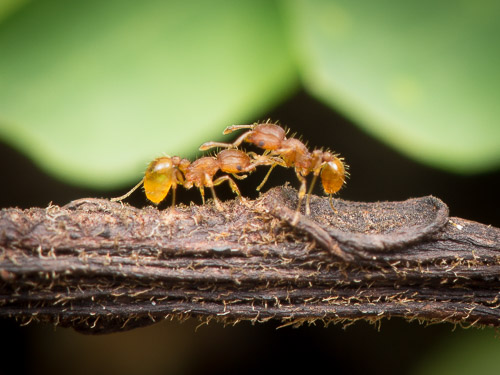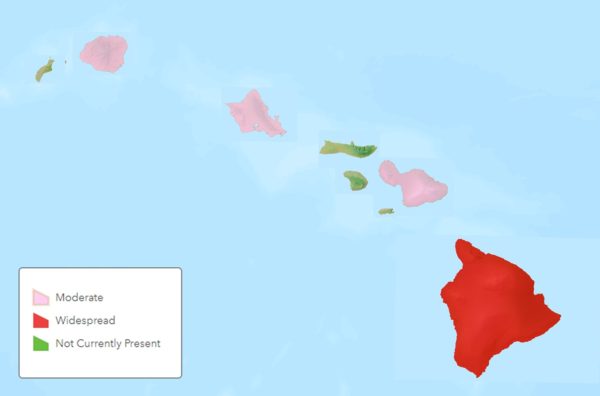
Hawaii Ant Lab
Two little fire ants climbing over each other.
An emergency response team will be created to help contain and eradicate invasive organisms, among other changes, if a proposed bill becomes state law.
Sections of House Bill 427 would grant the Hawaiʻi Department of Agriculture greater authority over its biosecurity policies.
HB 427 also would change the department’s name to the Department of Agriculture and Biosecurity and would create the new position of deputy chairperson of biosecurity, who would oversee the state agency’s biosecurity initiatives.
The bill would also establish the previously mentioned biosecurity emergency response program, made up of a group of state and local employees who have experience with the containment and eradication of organisms. In the event of a biosecurity emergency, the team would be activated to organize a rapid response.
A key part of the bill would authorize the department chairperson to order the quarantine of any area that is proven or suspected of having an invasive species infestation.
Finally, the bill would expand the department’s inspection powers with the creation of transitional facilities. Under the department’s order, imported items would be transported from a port of entry to the facility, and be inspected by newly established biosecurity inspector positions. These inspectors would be trained and licensed by the state Department of Commerce and Consumer Affairs.
Sen. Jarrett Keohokalole, a proponent of stronger invasive species policies, said he was concerned with the department’s outdated policies on invasive species.
“Most of the agricultural laws that exist in Hawaiʻi were passed 100 years ago to address challenges of the plantation era—the sugar plantation era in Hawaiʻi,” Keohokalole said. “So it’s become very clear that we need to update and modernize how we deal with modern day challenges and pest challenges.”
The bill’s intent is to clarify loopholes in the department’s existing biosecurity policies, and to stop the fast spread of harmful invasive species.
In their most recent testimony, the Department of Agriculture said they support the bill and only recommended technical changes.
Carnival Raised Concerns
During an informational hearing last year, state senators raised concerns around Hawaiʻi’s biosecurity in part because of last year’s Punahou Carnival.
The carnival received a batch of around 400 donated plants infested with little fire ants and notified the state Department of Agriculture before any sales were made.
Seven donors were identified and six were cooperative, while the department reported that the seventh was “unresponsive.”
During the briefing hearing, senators questioned why the agency didn’t take more action, like revealing its name, to compel the seventh entity to cooperate.
At the time, the department said it couldn’t name the donor because of the potential for lawsuits and other litigation to be filed against the state.
House Bill 427 would allow the department to take more action on those situations in the future, especially since the bill would authorize the quarantine of any area that is proven or suspected of having an invasive species infestation under the order of the HDOA chairperson.

Little fire ants are already widespread on Hawaiʻi island, while the spread across the other three counties is considered moderate, according to the state Department of Land and Natural Resources.
“If we don’t get a handle on LFA and really crack down on the vectors of spread, then they’re going to spread faster than we can eliminate them and then eradicate,” said Wayne Tanaka, the director of the Sierra Club Hawaiʻi chapter, an environmental advocacy and action group.
Without intervention, the LFA outbreaks could worsen, posing major health, environmental, and economic risks. On Hawaiʻi Island, little fire ant infestations have already damaged crops like bananas, costing local farmers thousands of dollars in eradication measures, Tanaka said.
“We’ve heard horror stories from the Big Island of people picking bananas or flowers in their trees and being showered down by thousands of little ants that fall in clothes and bite and really wreak havoc,” Keohokalole said.
Beyond agriculture, invasive species also threaten various aspects of life in Hawaiʻi.
“You’re impacting food security, impacting cultural integrity, and impacting native species,” Tanaka said on the dangers of LFA. “Any kind of business that deals with outdoor recreation or being outdoor spaces – those are all things that have been and could continue to be impacted.”
According to the HDOA website, a sting from a little fire ant could even lead to permanent blindness in household pets like cats and dogs.
Lawmakers will continue deliberations in conference committee.